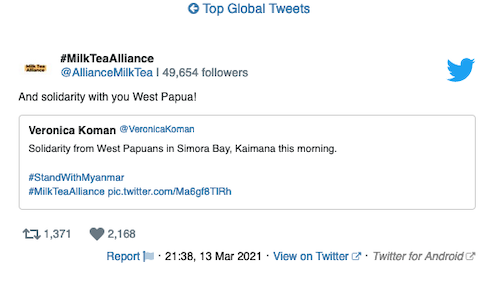OPINION: By Theo Hesegem in Wamena, Papua
Indonesian President Joko Widodo has repeatedly made trips to two of Melanesian provinces, Papua and West Papua, in the easternmost part of Indonesia.
However, the working visits made by the head of state to the land of Papua have actually not produced the results expected by indigenous Papuans.
The President always prioritises infrastructure, while the hopes of indigenous Papuans have been that the President would be serious about handling and resolving cases of alleged human rights violations in Papua.
The visit of the head of state is only ceremonial. It is as if the father comes and the child is happy. He does not have good intentions to resolve cases of alleged human rights violations in Papua.
The president always prioritises the interests of the nation and the state, and never thinks of the interests of “humanity”. He should see the real interests for Papuans are self-esteem and dignity.
Meanwhile, the conflict in Papua continues to claim casualties. As a president, he should think about the people who are experiencing casualties and also the refugees who have now lost their leader.
As executive director of the Papua Justice and Human Integrity Foundation and a world human rights defender, I would say that the ability of a president is very limited and immeasurable, even though he has served for two periods as President of the Republic of Indonesia.
In our encounters with the president, he has been aware that all this time the conflict in Papua continues to claim a lot of casualties. It appears that the president is unable to handle and resolve cases of alleged human rights violations in the Land of Papua.
Indonesia’s focus is always on the strength of the military apparatus in Papua, thus they always send non-organic troops to carry out military operations.
According to the president, sending thousands of troops to Papua is considered addressing the problem of Papua, and thus human rights violations in Papua will end. I believe the conflict will increase greatly.
Does this president have no solutions and policies?
In my opinion, no. The president seems incapable and he has no new policies and no initiatives against the violence that has just an adverse impact on civil society as his own citizens. He sits on a soft and comfortable chair and just orders the commander and the chief of police to send troops to West Papua.
As a citizen of this country, I am ashamed that the president’s policy of always sending an extraordinary numbers of troops in Papua, thousands of Indonesia Military (TNI) and Police (POLRI) forces have now occupied the land of Papua.
We know several countries around the world have highlighted Indonesian and the human human rights violations. However, the President has not taken this spotlight seriously, perhaps because he considered it is an ordinary thing.
So, the situation of human rights violations in Papua are not taken seriously and resolved with the heart.
Law enforcement operations?
President Widodo needs to explain the status of the conflict in Papua to the Papuan people and the international community.
Is it a military operation or a law enforcement operation? So that the Papuans and international observers can know clearly.
The reason why the president has to explain these two things is that the status of the conflict in Tanah Papua is not yet clear, even though law enforcement officials often say that the operations in Nduga and Intan Jaya are for law enforcement.
This situation is very worrying because civilians who do not have weapons and do not know about any problems are always victims. Therefore, this impacts seriously on indigenous Papuans experiencing an extraordinary humanitarian crisis, and almost every time there are victims.
Failures and wrong operations
Previously, we knew that the operations in Nduga and Intan Jaya regencies were law enforcement operations. However, law enforcement operations have failed.
Law enforcement operations of the Indonesia military and police officers have not succeeded in arresting Egianus Kogoya and his friends who are alleged to have carried out the massacre at Mount Kabo on December 2, 2018, until now – three months into 2021.
The capabilities and actions of the officers are actually worse in the process of searching for the Free Papua Organisation (OPM) suspects. To this day, we have never heard that the group led by Egianus Kogoya and his friends have been arrested and processed.
Where are the thousands of military troops who have been assigned to Papua?
The law enforcement process has not gone well according to the expectations of the Indonesian government.
People who were suspected of being OPM have been immediately executed on the spot and members of the TNI only submitted evidence to the law enforcement apparatus without being accompanied by the person arrested.
Is it by means of submitting evidence without the person that the law enforcement process can be run.
The TNI/POLRI military apparatus needs to learn professional law enforcement processes, so that the application of the law in the field can be carried out in accordance with the mechanisms or laws in force in Indonesia.
Civilians who were arrested were shot, then the authorities put the gun on their chest or body to show it as having belonged to them, then the TNI apparatus handed over only the evidence – pistol – to the law enforcement apparatus.
Law enforcement officials do not dare to prove in an honest and fair investigation that the weapons really belonged to the OPM or were engineered by officers in the field.
Missing serial numbers on firearms
The law enforcement process is very important, so that anyone who has committed a violation of the law must be processed according to the applicable law in Indonesia.
The confiscation of evidence of weapons in the hands of the OPM was a success of the TNI/POLRI apparatus, only the weapons in question could not be proven in the law enforcement process.
For example, the police, as law enforcement officers can prove with the serial number of the pistol or weapon seized in the hands of the OPM to be able to prove it with the serial number registered in each police or military institution. This is ecause all weapons and pistols used by the TNI and POLRI officers have been officially registered with their respective institutions.
Thus the serial number of the weapon needs to be proven. If the serial number of the weapon or pistol is not registered, it means that the weapon or pistol belongs to the OPM.
Then in the process of proving the serial numbers of weapons and pistols registered with the military institution or POLRI, it means that there has been manipulation in the field by the authorities.
For this reason, proving a weapon’s number is very important, but to my knowledge, the authorities as law enforcers have never done it. A serious failure.
This is why I argue that the operations in Nduga and Intan Jaya are law enforcement operations that have failed and gone wrong.
President does not respect citizens
President Widodo does not respect its own people, which to this day, the indigenous Papuan people, as citizens, have always been victims of violence, but a president just chooses to remain silent.
As a human rights defender, I am very disappointed with the attitude of a president who does not protect civilians, indigenous Papuans, as citizens who have the right to live and to freedom.
The president also does not respect the international community which always urges open access to the Human Rights Commission of the United Nations and foreign journalists to enter Papua.
Perhaps, according to the president, the humanitarian crisis in Papua is considered an ordinary thing, not an extraordinary thing, so that Jakarta always sends troops to carry out military operations in Papua.
Honourable President, I, as a human rights defender in Papua, am very surprised and feel sad about the attitude of a president who always sends troops using warships to lean on Jayapura for military operations in Papua Land.
I appeal to you, President Widodo, to please convey honestly to us as the Papuan region about sending of troops in such excessive numbers.
If indeed Papua has been designated as a Military Emergency Operation area, we need to know that! Being honest is an important part of being a President.
Theo Hesegem is the executive director of the Papua Justice and Human Integrity Foundation and a world human rights defender. This article was contributed to Asia Pacific Report.
This post was originally published on Asia Pacific Report.





